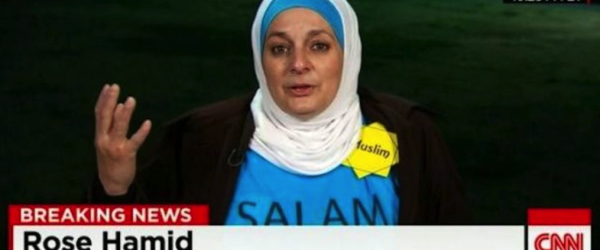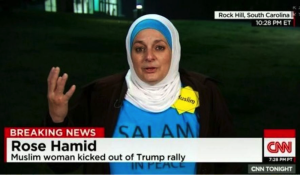For this article, I will refer to aforementioned United States presidential candidate as DT. I do not wish to contribute to the searchability of his name, nor do I wish to spend more time typing his name than necessary.
On January 8th, Rose Hamid and her friend, Marty Rosenbluth attended a DT rally in Rock Hill, South Carolina. Hamid, a 56-year old flight attendant, wore a white hijab, a bright blue shirt which read, “Salam I come in peace,” and a yellow eight-point star with the word “Muslim” written on it, a quiet attack on DT’s suggestion that he would consider implementing a “special form of identification” for American Muslims. Hamid’s intentions were simple and direct: to interact with DT supporters who might not otherwise have met a Muslim and prove to them that Muslims are “not that scary”. Before and during the event, Hamid engaged in polite conversation with DT fans, but when his rhetoric turned towards Syrian refugees, Rosenbluth had had enough, and Hamid joined him in silent solidarity. As per DT rally protocol, the two were quickly escorted out amid a chorus of DT-supporting chants.
On the one hand, I absolutely support Hamid in her efforts to demonstrate that Muslims are normal people who, for instance, attend the rallies of presidential candidates. Her interactions with the DT supporters sitting near her may have left them with more positive images of Islam and of Muslims, but I don’t think she should have stood up at the rally. While Hamid’s actions were innocent on the individual level, what the audience saw was, and subsequently what the media sees is, her ejection. To those who did not interact with Hamid, and to those who already believe Muslims to be terrorists, Hamid appears to be nothing but a problem; she disrupted an otherwise peaceful (if the word can be used to describe a DT event) rally. Hamid herself mentions the “hateful crowd mentality” that “took over” while security saw her out. The webpage now dedicated to keeping an account of her alleged terrorist activities is evidence of a possibly small, but very real portion of the U.S. population that refuse to accept that fact that #NotAllMuslims strap bombs to their chests.
As with other DT rally disturbances, the U.S. media seemed to lap up Hamid’s story. I assumed the media monster was just hungry to add fuel to the DT fire. Then I read that Kaddie Abdul, a Muslim and an IT data engineer, also attended a rally. Abdul chose to follow in Hamid’s footsteps, believing “Hamid was on the right path.” The difference between Hamid’s story and Abdul’s story, however, is the amount of coverage it received. Multiple big-name media outlets, including The Guardian, Washington Post, the International Business Times, and Marie Claire, have picked up Hamid’s story while one big name– The Guardian— bothered to print Abdul’s story. There’s a critique of the mainstream media in all this (it only runs the stories it finds convenient) but there’s also an important lesson: we can make all the waves we want, but we can’t control where they break. Abdul challenged DT supporters directly by engaging them in political conversation; the information in her article is valuable to those who seek to understand DT supporters and the public would have benefited from being exposed to it. If the rest of DT’s supporters are anything like the few Abdul interacted with, then many of them are not particularly different from other voters: they feel dissatisfied with the current political situation, and they want to elect a candidate who promises to offer results. Hamid indeed had positive interactions with the few people sitting around her, and the benefits of her actions lie more with those people than with people reading her story.
My point in contrasting these two protest styles is to illustrate the different ways in which we, as Muslims (or as citizens in general) in the United States, can work against DT. Making noise, depending on when and how it’s done, can sometimes us negative attention, even to the point of fueling DT’s campaign. We can interact with his supporters and with the rest of America to prove that we are not bad people, though of course we shouldn’t need to. As Islamophobic sentiment rises, Muslims are bending over backwards to assure people that #NotAllMuslims are responsible, that they are “moderate” Muslims (a term that is extremely problematic; the adjective is meant to describe climates and political leanings, not a religion), and that they condemn acts of terror. Rather than only focusing on DT or on Muslims, we should also turn our time and attention towards the candidates we do support. We can give them press to counter coverage of DT’s campaign (which seems to be the only campaign I hear about these days). The United States has had its fair share of candidates whose controversial ideas confused or outraged the public. Racial justice and civil rights activist Linda Sarsour believes “VOTING MATTERS.” I personally believe every step away from belligerent racism matters, so long as the step is well placed.


